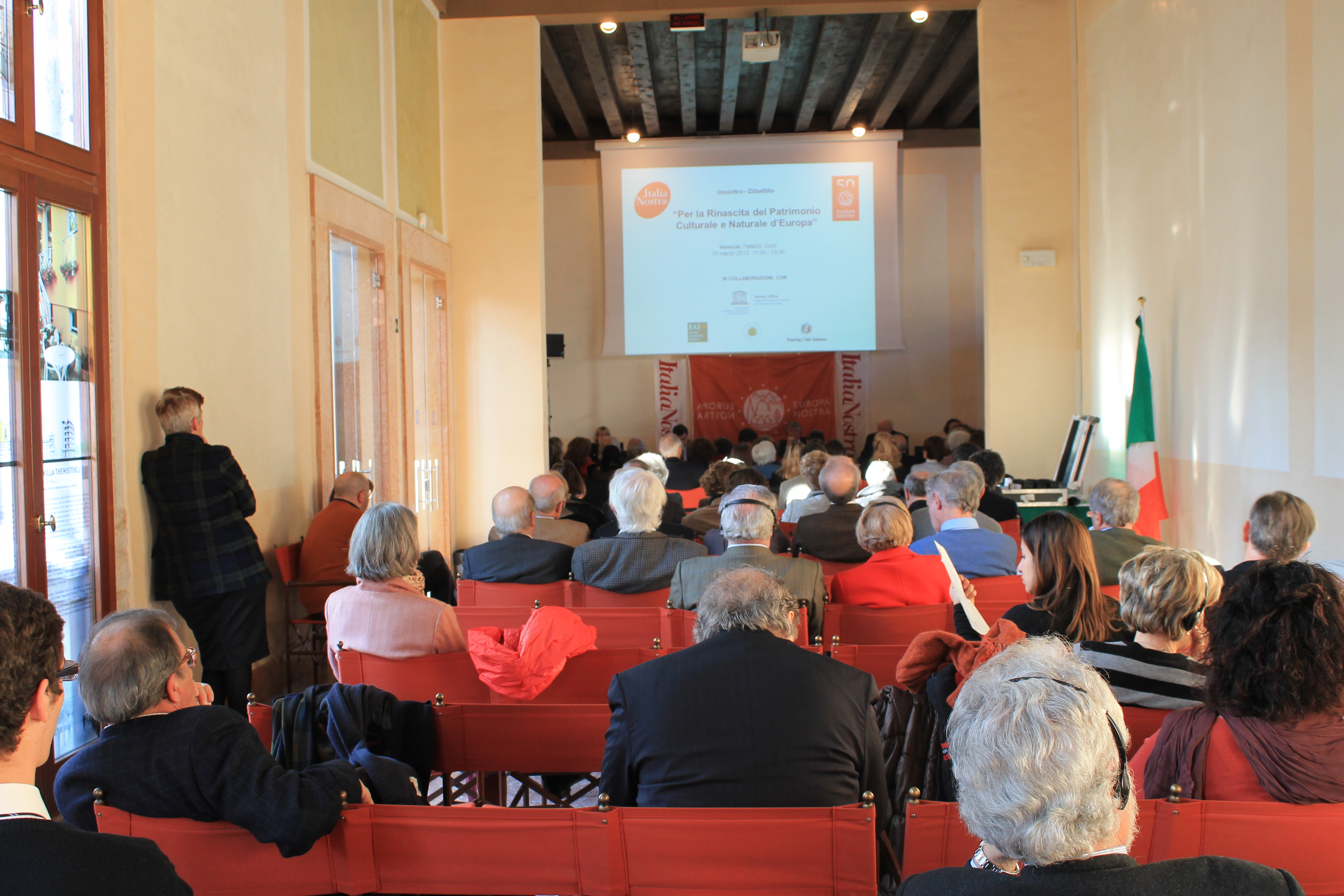What is the point of defending the Euro if we do not defend European Culture?
“We must have the courage to protect a Europe of Culture. We must guard our common heritage. Money does not work by itself. What is the point of defending the Euro if we do not defend European culture?” This fundamental question was provocatively raised by the Italian professor and art critic Philippe Daverio, during his opening speech at the public debate hosted by Europa Nostra and Italia Nostra in Venice on 15 March. This occasion was also used to launch an appeal for a ‘New Deal for Europe’ based on a true renaissance of our unique culture and heritage.
“The economic and financial crisis has had a profoundly negative impact on the cultural sector. All European countries have faced huge cuts in this field. In response to such alarming trends, UNESCO is seeking to demonstrate that culture is a crucial factor in development not only socially but economically. In several countries it constitutes up to 5% of GDP. Culture is very important: even more important than other industries, although not as widely-acknowledged. The European Union continues to finance cultural programmes but doesn’t prioritise culture in its strategic development. We must, therefore, form a new alliance between international institutions, NGO’s, the private sector and civil society to place culture and heritage at the centre of politics”, stated UNESCO’s Assistant Director-General for Culture Francesco Bandarin.
Europa Nostra’s Executive President Denis de Kergorlay expressed his enthusiasm for having UNESCO as an ally in the battle to promote culture and heritage at national, European and international levels. “Some politicians say that in the current situation, with high levels of unemployment, increasing rates of poverty and large public deficits, it would be inappropriate to grant more subsidies to historical monuments and sites. However, they must understand that heritage is part of the solution, not the problem. Cultural and natural heritage can help the European Union to overcome its economic and social difficulties. In fact, the sector provides jobs for millions of people and is a significant source of economic growth. In addition, it creates links between generations and strengthens the ties between the various cultures which shape Europe”.
Italia Nostra’s President Marco Parini reinforced this viewpoint on the basis of the Italian experience. “Europe can, and must, find in the cultural sector a strong engine for economic growth. Almost 63 million people visited non-state museums, monuments and archaeological sites and around 40 million visited state-owned properties in Italy in 2012, according to the statistics published by the Italian Ministry of Culture and Heritage. These figures are, indeed, very impressiv and very telling. Cultural tourism stimulates the economy, the transport sector, the hospitality and catering industries, and trade as a whole. It creates jobs and brings in foreign currency”, stressed Marco Parini.
“The action we need to pursue, addressing each and every European minister of culture, and also each and every national parliament, is to promote culture as our key resource. We need a ‘New Deal for Europe’ based on culture and heritage; we must ask that such a plan of reforms, like the American recovery plan of 1933, is introduced as a priority in the political and economic programmes of European governments and EU Institutions”, urged Italia Nostra’s President.
During his concluding remarks, professor Philippe Daverio explained why it is vital to protect and invest in the culture of Europe.
“The very existence of Europe is fundamentally linked to the idea of European culture. The pooling of coal and steel industries in the 1950s was a success and allowed the Treaty of Rome to lay the foundations of a European Economic Community. However, Europe can only be truly developed on the basis of a shared community of cultures and values. This is not an easy goal, as we have a wide variety of languages, but we must nevertheless persist on this fundamental goal”, insisted Philippe Daverio.
“Before Europe started building an economic and political community, it had already developed a shared architectural and artistic culture, for example the Romanesque, the Gothic, the Renaissance, the Neoclassical styles… We have the same pillars featuring in the historical buildings of St Petersburg, Naples, Paris, Berlin and Munich… These pillars must be the base of our identity and of our future”, added Daverio.
The following top-level representatives of public and private organisations from Italy added their valuable contributions to this important public debate which took place at UNESCO’s Regional Office for Science and Culture in Venice: Antonia Pasqua Recchia, Secretary-General of the Italian Ministry of Culture and her colleague Erminia Sciacchitano, Marco Magnifico, Executive Vice-president of FAI (Fondo Ambiente Italiano), Umberto Marcello del Majno, President of the Association of International Private Committees for the Safeguard of Venice, Antonio Foscari Widmann Rezzonico, Council Member of the Touring Club Italiano, Lidia Fersuoach, President of the Venice section of Italia Nostra, and Francesco Calzolaio, Italian member of Europa Nostra’s Industrial and Engineering Heritage Committee. The Council of Europe was represented by Alberto d’Alessandro, Head of its Venice Office.







